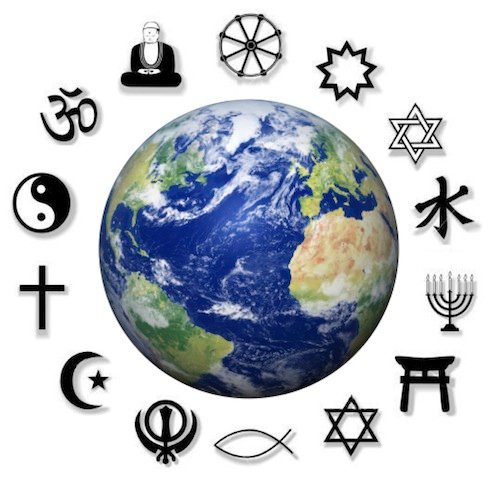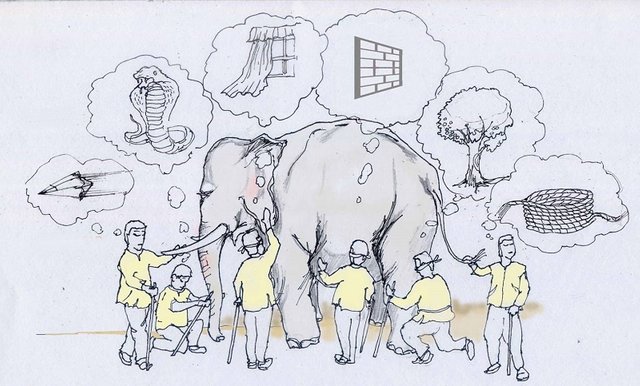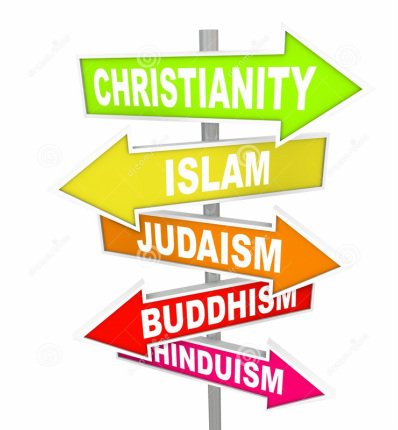Are all Religions the same?

Many people believe that all religions are the same. Essentially good people go to heaven, bad people go to hell, and all religions worship the same God. There is even a story about blind people touching an elephant, and trying to guess what it is. One blind man touches the leg, and calls it a tree. One says the side of elephant is a wall. It keeps going with the different limbs of the animal. In conclusion all religions may sounds different, but they are all part of the same God.
In reality all the blind men got it wrong. This is extremely dangerous as the guy thinks he is next to a nice sturdy wall. Not realizing the elephant is strong, and mobile. For one to dedicate their life to a religion they need to be correct.

All religions are actually different. Not all believe there is one God. Some don't believe in God, while others believe in many Gods. Those are pretty fundamentally different from each other. What might be considered "good" in one religion could be considered "bad" in another.
It would be impossible for me to go through every single religion as there are thousands. I can however, simplify all these religions to about 12 world religions. We can do this, because essentially all religions belief structures goes back to these 12. However, the many religions is based on how the people operate these belief structures. To simplify it even more we can go to 5 world religions. These are the most popular, and most well known for the majority of people.

Islam, Judaism, Christianity, Hinduism, and Buddhism. These are the most popular/well known religions. All have similarities, but are fundamentally different. One however, stands out from the rest. To see the big difference we need to look at their religious leaders.
- Mohamed
- Moses
- Jesus
- Gandhi
- Buddha
Christianity actually stands out for the thing they proclaim about their leader. No other religion say the same thing. In fact it is so crucial to their religion that if someone doesn't proclaim it, it means they are either A not a Christian, or B not a Christian.
If you come to a fork in the road, and you're looking for the correct way to go. There are two people at the fork. One is dead. They other is alive. Who do you ask?
Christianity proclaims that Jesus is alive. Yes even after 2000 years they are still proclaiming that Jesus is alive. This is quite a bold statement. If it turns out to be true then how does it affect your life?
What do you think?
Leave a comment bellow:
Is Jesus alive? Where is your evidence? You sure He is dead? Where is your evidence?
As a theologian I do have some comments. First of all the difference between the 3 first you mention is that they are monotheistic ones. Then, Jesus, for the Christians wasn't just a religious leader but supposedly God's Son himself - which is not the case for the rest. There are many details like that which only within research make actually some sense. The point is though, besides studying and all, faith. The most important thing to remember when it comes to religions (and I say this with some certainty after a decade and more studying them) is that sometimes evidence is not as important as faith...
In a lot of the more mystical religions or mystical groups within bigger religions, experience (as a form of evidence) is greater than faith (defined as a blind choice to believe). Faith, as a virtue, is something greater than we commonly think of it. It's something obtained after a divine or mystical experience and not just a mental construct or something you lie to yourself about.
I don't see mystical experience as part of any religion, personally, but I see what you're saying. And of course, what you choose to 'believe' sometimes can be just lying ;)
Understood. There are mystical traditions within the various religions, like Sufism (Islam), Kabbalah (Judaism), Orthodoxy (Christianity). At the deepest core of these traditions is a kind of unification of all religion and therefore mysticism seems to transcend religion. Although religion can provide a gateway to and a structure for the attainment of mystical experience.
As a Greek Orthodox and theologian, may ask what is your field of education? I'm asking this because saying that orthodoxy is a mystical tradition of Christianity is not only extremely offensive but mostly amazingly uneducated on the matter. Unfortunately my time doesn't allow me to elaborate further on that, but that's why there are books (not only the internet), so I would suggest you open one to see that the first Christians back in the day were basically Orthodox. Even the term Eastern Orthodox Church doesn't really apply as because originally, before the Schism, there was only one, the Orthodox one. But saying it's a mystical tradition is beyond me, to the least continue this conversation - I liked at first but now I see there's no common ground of education to go on with it!! I'm so sorry, I hope you understand. Steem on!
I'm really sorry to have offended you. I'm careful always to be respectful of other people's beliefs.
A major component in the practice of Orthodox Christianity is the attainment of Theosis. It is even said that it is the purpose of man. If that is the goal, to participate in the divine nature; to become so much like God that you participate in His nature, and there are practices or rituals to facilitate that goal, then it can be considered a mystical tradition.
It's likely that the term carries some extra baggage for you, being associated with magical practices or polytheism. However mysticism refers to the goal (some sort of union with God, not necessarily complete union as that's likely impossible) and any reference to practices (such as magic) are external to the term.
The way the term is used in your culture or in the groups you surround yourself with, likely devout Orthodox Christians, is different than it is used in my environment. I am deeply devoted to the goal of mysticism (some level of union with God), both through study and practice, and surround myself with such people.
I do agree that Orthodox Christianity has a strong claim for being the "one, holy, catholic, and apostolic church" and even hold that as my opinion. We do not disagree there and by labeling it a mystical tradition I wasn't suggesting it was an offshoot or an outlier in Christianity. In fact I believe it to be the truest branch of Christianity (while not in a way that makes other Christians less Christian) and have considered converting.
Some extra reading that might be helpful:
https://www.ancientfaith.com/specials/eastern_orthodoxy_and_mysticism/orthodoxy_and_mysticism_part_1
http://orthodoxinfo.com/general/lossky_intro.aspx
Edit:
https://en.wikipedia.org/wiki/Mysticism